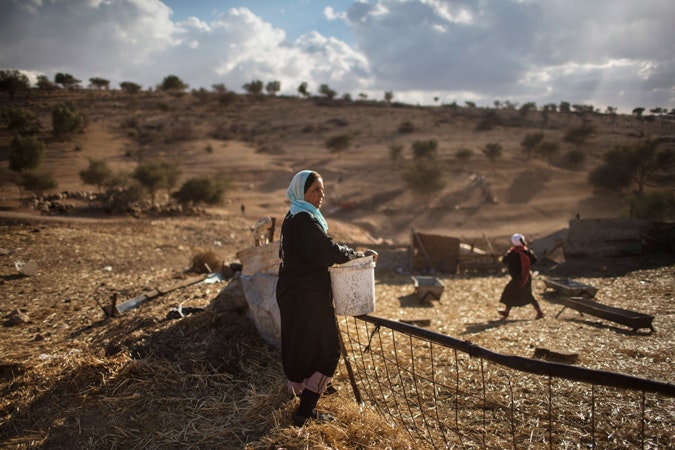Demolishing a Bedouin Village to Build an Israeli Town
By Suhad Bishara

For years, the Bedouin community of Umm el-Hieran in the eastern Naqab (the Negev) has lived with the threat of eviction hanging over them. In July 2002, the Israeli government announced a plan to build a Jewish town called “Hiran” where Umm el-Hieran stands, together with three other new towns in the Naqab. On the site of Atir, Umm el-Hieran’s sister town, trees and grazing land have been planned. Umm el-Hieran stands near the Green Line, where the state sees Jewish settlement as a strategic imperative.
As the plan has progressed, Adalah, the Legal Center for Arab Minority Rights in Israel, has engaged in two tracks of legal actions to stop the eviction of residents from Umm el-Hieran. In 2011, we appealed against 33 home demolition orders against the homes of Bedouin residents of Umm el-Hieran.
When the Beer Sheva District Court rejected our appeal in March 2014, we filed a motion for permission to appeal the decision again before the Israeli Supreme Court, as is necessary under Israeli law. We have also appealed against eviction orders served on the residents of Umm el-Hieran since 2004; these cases are also pending before the District Court and the Supreme Court. We have also brought objections to the building of Hiran to land planning committees.
The fact that the state of Israel is attempting to displace the 500 people who live in Umm el-Hieran in favor of a new development town is lamentable enough. After all, the Palestinian Bedouin are Israeli citizens, even if this kind of treatment is sadly typical of their second- or third-class status in Israel. But the circumstances under which the Bedouin arrived in the area of Umm el-Hieran lend their current predicament a terrible absurdity.
The Bedouin have been in the Naqab for thousands of years. In the 20th century, they fell victim to borders that they had no part in drawing. The Bedouin were removed from the western part of the Naqab, their ancestral homeland, after the war of 1948 and moved east by the Israeli military. In 1956, the military governor ordered this particular community to settle in what were to become Umm el-Hieran and Atir. But the villages remained unrecognized, meaning that the people forcibly relocated to the area did not receive any services and were not connected to any infrastructure.
One of the core decisions that we are appealing now applies logic that reads like it is taken from Joseph Heller’s classic novel Catch-22. The judge conceded that the State of Israel had relocated the Bedouin to the village, but ruled that the homes built since 1956 are illegal and could therefore be demolished. Even though the Bedouin were forced to live here by the government, the government does not recognize the village as a place of habitation. One wonders what the people who were forcibly moved here were supposed to do.
Adalah is challenging this ruling, as well as the rulings in the evictions cases on the basis that the Bedouin are being viewed as a legal obstacle to the construction of the new town. The idea that the people have to move is entirely unacceptable. Since the village was established on the order of the military governor, it can hardly be argued that its inhabitants are “trespassers on State land.” Yet the state is treating the Bedouin as exactly that, saying that they built homes without permission. There is no justification in this argument for evicting the inhabitants and demolishing the village.
In our opinion, it is also entirely unacceptable to evict one group of citizens in order to accommodate another group, allowing the newcomers to build on the ashes and ruins of the previous community. And in it is doubly dehumanizing to be evicted in favor of grazing land for new settlers’ farm animals.
The residents of Umm el-Hieran and Atir have invested a great deal in establishing their homes under harsh conditions for almost 60 years. In addition to their property, their dignity is at stake. We believe the evictions are legally, morally and historically wrong. The state has announced that the displaced Bedouin community would be sent to live in Hura, a government-planned recognized Bedouin town, but we reject the principle of creating what is essentially a new community of forced refugees.
Unfortunately, the state’s legal attempt to evict the people of Umm el-Hieran is consistent with the standard treatment of Bedouin Palestinians. There are around 200,000 Bedouin citizens of Israel living in the Naqab; 90,000 in 35 unrecognized villages. The state of Israel routinely suspends their constitutional and human rights, as it seeks to implement its policies. Neither the Bedouin titles to their ancestral lands, nor the historical villages that existed prior to the establishment of the state are recognized. The state denies the Bedouin basic services like water, electricity, sewers, as well as education and health care in the unrecognized villages.
Adalah seeks to represent this particularly vulnerable and weak group along with other NGOs and community-based groups such as the Regional Council for the Unrecognized Villages. If the plight of the Bedouin has received international attention, it has been because of the Prawer Plan to resettle 70,000 Bedouin from the Naqab that was approved by the government in 2011 and passed in a first reading by the Knesset in June 2013 in a close vote. (Ehud Prawer is the government official who drafted the plan.) If the bill were enacted into law, it would raze most the 35 unrecognized villages, thereby displacing most of the Bedouin community in these villages.
The Prawer Plan drew opposition from Arab and Jewish members of Israel’s Parliament, and led to a historic resolution from the European Parliament in 2012 that called on Israel to withdraw the Plan. Its current legislative status is unclear—it has been frozen by the Netanyahu government since December 2013 but not entirely withdrawn.
In Umm el-Hieran, there will be no demolition until the court delivers a decision. It is an uneasy situation because like the Prawer Plan, these decisions are also awaiting possible implementation. Adalah will continue its legal work and advocacy, and the community itself is a key actor. We advocated before the European Parliament on behalf of the Bedouin, and we know that foreign governments asked hard questions of Israel. This international advocacy is work we have done since 1996 on behalf of the 1.2 million Palestinian Arab citizens of Israel, and Palestinians living in the Occupied Palestinian Territory, work that I have personally been involved in since 2001.
We know that so much rests on the outcome of the cases that we have filed. Adalah is also involved in other legal challenges, like one on behalf of the Arab Bedouin residents of the unrecognized village of Alsira, where we won an important ruling on May 1. In this case, the District Court rejected an appeal by the state challenging a lower court’s decision to cancel 51 home demolition orders in the village. This is a decision that we hope bolsters our other pending cases before all levels of Israeli courts.
There is an alternative to the Prawer Plan that would allow the Bedouin communities to develop organically, free of their unrecognized limbo and safe from eviction and displacement. Adalah means “justice” in Arabic, and this is what we seek for the Bedouin people of Umm-el Hieran and elsewhere. To begin with, they must be allowed to live unhindered in the place where the government sent them 60 years ago. In other words, the government should “recognize” these villages now.
Adalah is a grantee of the Open Society Foundations.
Suhad Bishara is director of the Land & Planning Unit for Adalah, the Legal Center for Arab Minority Rights in Israel.


